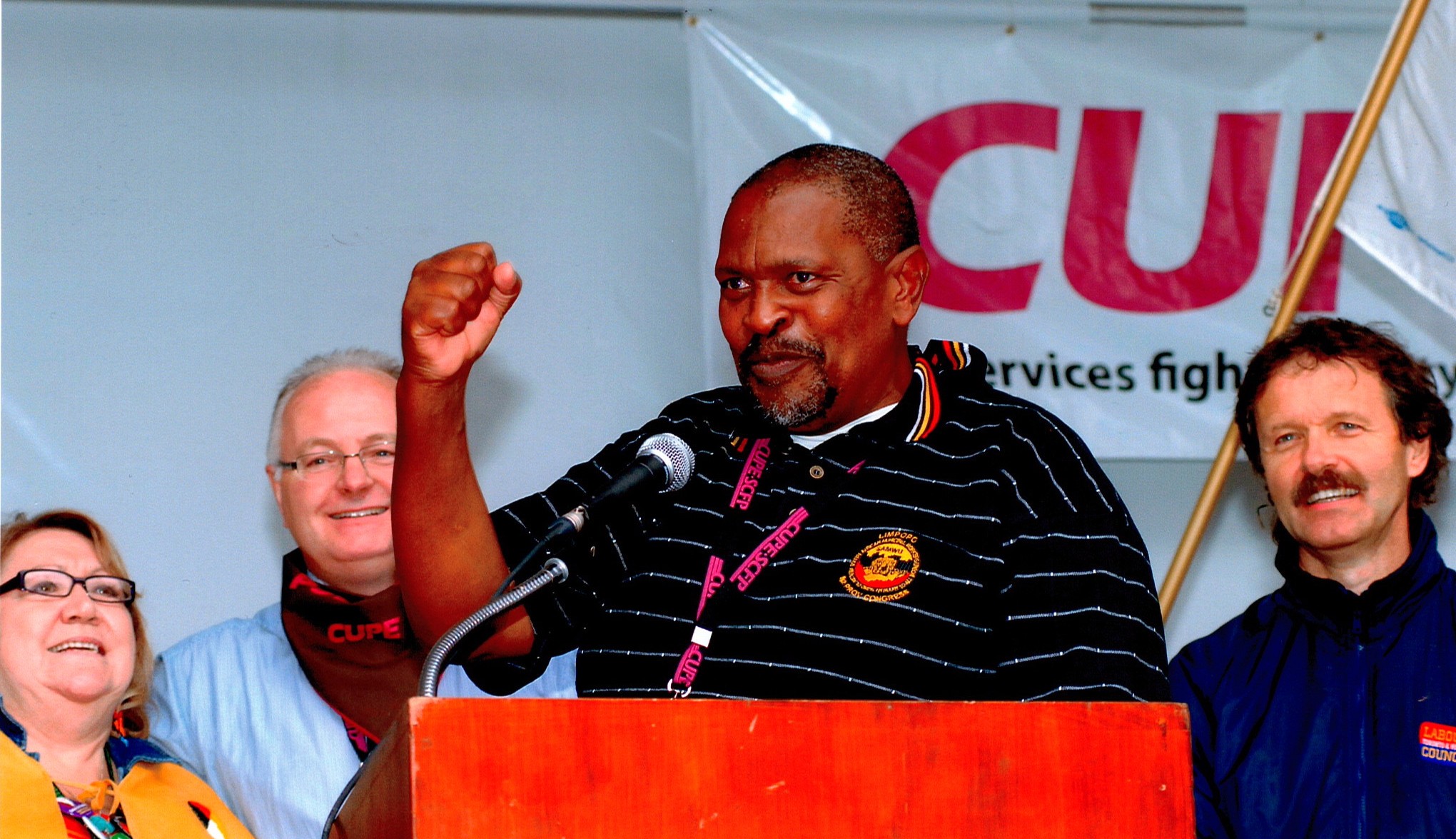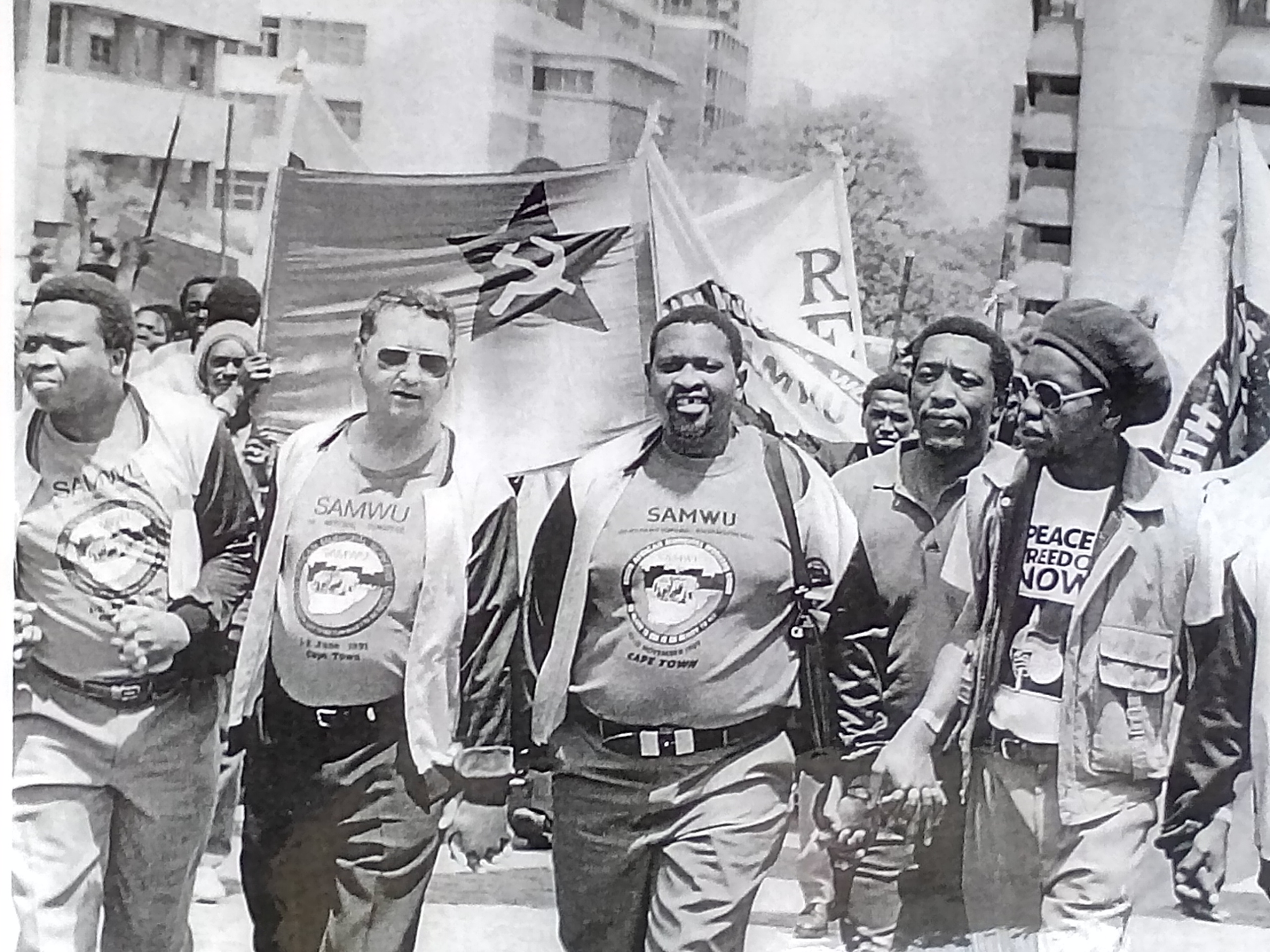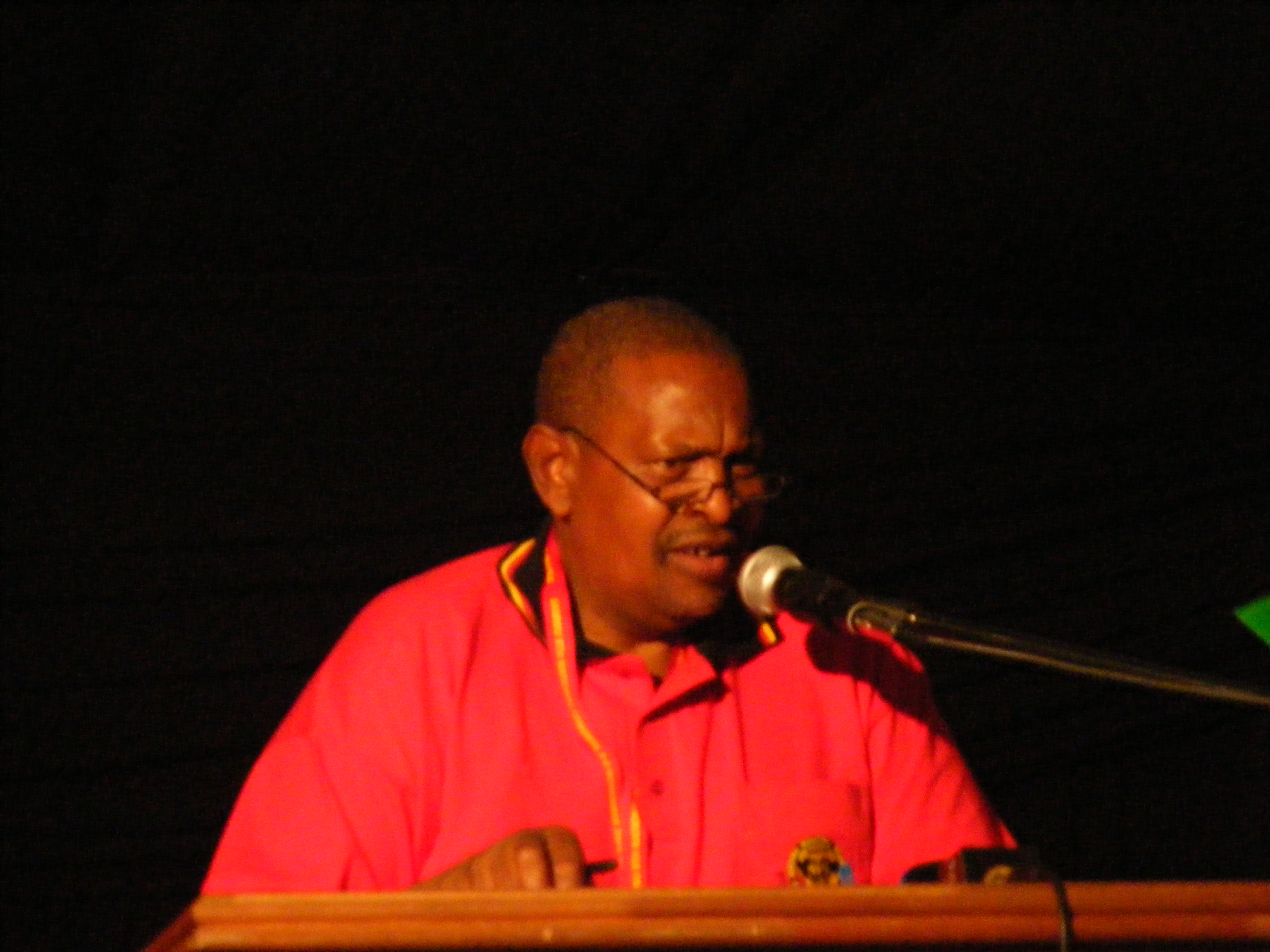Petrus Mashishi, President of the South African Municipal Workers Union (SAMWU) from its founding in 1987 until 2009, was both a man of his times and a giant representing working class principles of co-operation, democracy, probity and the best in human values. He lived through the rigours of apartheid, the transition to democracy, and in more recent times the splitting of the trade union movement he had helped to found. He was witness to the rise of predatory and corrupt tendencies within the state, out of what had once been a proud struggle for liberation.
May his passing on the 3rd July 2018 be marked as a moment of contemplation in which divisive voices within the ranks of the trade union movement are stilled. What he stood for was the antithesis of what he had to witness in his own union and in Cosatu over the past 8 years. He witnessed it at its sharpest when with Charles Nupen he was asked to mediate differences within Cosatu and failed. He witnessed SAMWU splintering as one group expelled any leader of principle who demanded financial accountability. He witnessed the looting of union finances.
Yet to the end Mashishi hoped and believed that worker unity could be forged anew.
Petrus Mashishi was born on the 28th June 1948 in Alexandra. After leaving school he was taken on by Johannesburg City Council in 1969 to be trained as an artisan in terms of the Bantu Building Workers Act of 1951. This Act provided for the training of African building artisans on condition that they only be allowed to work in black residential or bantustan areas. His specialisation was in plumbing and sheet metal working. In the early 1970s the Apartheid state established Bantu Administration Boards in urban areas to remove black townships from ‘liberal’ white municipal control. Petrus and his fellow artisans found their jobs under threat as the registered white and coloured unions questioned their continued employment in white and coloured areas.
 Mashishi at a rally of the CUPE in Canada
Mashishi at a rally of the CUPE in Canada
Comrade Mashishi and a group of affected workers approach the Industrial Aid Society (IAS) in 1978. IAS was an advice centre associated with the Trade Union Advisory and Co-ordinating Council (TUACC). TUACC had emerged from the 1973 strikes in Durban. It had recently become a national federation with its roots in Natal and the Witwatersrand. These municipal workers become members of a structure called TUACC Workers Project. A press campaign and pressure from bodies such as the Black Sash and Council of Churches forced the City of Johannesburg to keep them on. He also participated in educational classes run by sympathetic Wits University intellectuals, such as the late historian Phil Bonner, around issues of South African working- class history and organisation, labour internationalism and basic labour law. Petrus was an avid reader, self- educator, and educator of fellow workers. An organic intellectual of the working class.
In 1979 TUACC gave way to the Federation of South African Trade Unions (Fosatu). Municipal workers were to be organised by the Transport and General Workers Union (T&GWU). Comrade Mashishi became the Transvaal Branch Chairperson and also a member of the union’s NEC. It was under Fosatu that he developed, and himself fostered, the key principles of workers controlling the union through participatory democracy. He was also exposed to issues of gender equality. He promoted a strong sense of union independence from employers and from political parties. Worker politics meant above all fostering workers unity. Party ideologies and interests were important, social and economic policy development was crucial, but workers needed to formulate their own union positions through internal debate and compromise. This central emphasis on workers control was about control over the union, its officials and leaders, but it was also about extending workers control over the shop-floor and society. Petrus stood for workers democracy and Socialism.
Organising of T&GWU in Johannesburg was difficult. The union used Works Committees as a tool to organise around and make representations. In the Depots it was strong in that it opposed the establishment of Liaison Committees. In 1980 the City Council HR Department sought to turn its coordination liaison committee structures into a sweetheart union to which all African workers would be forced to belong through a closed shop. Led by the bus drivers’ leader the late Joe Mave and by the late Martin Sere in the electricity department, and Phillip Dlamini, there was a walk-out. It was decided to set up a Black Municipal Workers Union (BMWU). They had hardly started organising when workers exploded in a mass strike. The T&GWU members joined the strike. There were mass dismissals with many in the dominantly migrant workforce being forcibly bussed back to the bantustans.
 1993 March against hostel violence
1993 March against hostel violence
BMWU was soon affected by splits. This was over the use of relief funds and ANC versus PAC politics. This led to the formation of the General Workers Union (MGWUSA) which aligned with the UDF and the SABMWU led by Dlamini and espousing PAC affinities. T&GWU stayed its course. In the aftermath it expanded its membership considerably by negotiating re-employment of many workers.
Comrade Mashishi served on the T&GWU Transvaal BEC and NEC in the early 1980’s. He served as a T&GWU representative in the “unity talks” to create a national municipal union. This process had its conflicts and delays, starting early in 1986 and dragging on to the launch of SAMWU in October 1987. The key unions in these talks were the Cape Town Municipal Workers Union (CTMWA), the T&GWU municipal sector, which were seen as ‘workerist” and a number of unions affiliated with the United Democratic Front (UDF) and characterised as “populist” in the rhetoric of the time. The latter included Municipal Workers Union of South Africa (MWUSA), a merger of MGWUSA from Johannesburg and a small Natal union, the South African Allied Workers Union (SAAWU) members from East London municipality and members of the General Worker Union of South Africa (GWUSA) from Port Elizabeth. Despite their differences SAMWU was finally launched.
CTMWA had looked to T&GWU to put up a person for President or Vice President while their John Ernstzen became General Secretary. The T&GWU caucus chose Mashishi to stand for President and Joe Spambo (Molitsane) from Natal in case other positions might need to be contested. Typically, Petrus was reluctant but the caucus was unanimous. The intention was that one from the other “UDF” unions would be elected as Vice President. However, their nominee was unacceptable, having antagonised many. In the end both Petrus and Spambo became President and Vice President.
There was a union on paper, but structures still had to be built from the bottom up. T&GWU, CTMWA and SAAWU had shop steward committees and membership. There were doubts about MWUSA’s democratic and membership substance in Johannesburg although the Natal section was strong in Newcastle. MWUSA as a municipal only union had formally to dissolve itself. CTMWA’s registration was to be the shell to register SAMWU by name change. T&GWU municipal members and the other workers were transferred from unions which remained in existence. In the end in the early 1990s four organisers for this stream were dismissed by the union for divisive activity which also included misleading workers in a number of smaller municipalities, later to form part of Ekhuruleni, about the dispute they claimed SAMWU had failed to support. In fact, the employers had declared the dispute. In the course of this division Petrus and a fellow leader were held hostage by angry workers in a hostel for 5 hours. They finally persuaded workers of their credibility. The union including MWUSA members who had invaded an NEC meeting on behalf of the dismissed officials emerged more united than ever. Comrade Mashishi was no stranger to the difficulties of countering divisive behaviour.
It was a hallmark of the comrade’s approach to trade unionism throughout, to turn the attention of the union to its grassroots. In these first years while the union was to be the most rapidly expanding union in South Africa it was hard work keeping up with all the problems. The union grew from perhaps 12 000 members at its launch to over 80 000 by 1993 and 120 000 by 1996. This was through recruitment, but also through merger of other pre-existing municipal in-house unions. The most substantial being the Durban Independent (previously Indian) Workers Union. Mashishi was a central figure in recruiting and negotiating municipal worker unity. This included uniting with the coloured municipal union in Johannesburg and a dummy union from 1980. SAMWU had by then expanded considerably in Johannesburg. A key moment that convinced workers of their home was the unions agitation and march in 1993 against hostel violence by Inkatha.
In all of his 22 years as SAMWU President he also represented SAMWU in COSATU and gained widespread recognition for his articulation of worker democracy and unity. It was fitting that Mashishi was to be one of the worker representatives sent by Cosatu to participate in the Cosatu September Commission in 1997 which sought to address the emerging problems of union organisation in a new democratic order. He also served Cosatu in a variety of capacities and was one of the longest serving member on its CEC by 2009. He also represented the Federation on the Labour Development Trust Board.
He was a key figure in Local Government Bargaining and the establishment of the South African Local Government Bargaining Council (SALGBC) in 1997. He occupied positions on the Executive and Negotiating Committees of the SALGBC through tough negotiations and strike actions in 2002, 2005 and 2009. He led the union from a point where it consisted of scattered groups of organised and semi-organised workers to a national union which could pull off repeated strike action across the country. He was a clear- headed strategist and effective negotiator. He was respected by the other major union in the sector, IMATU, as by his opponents in the South African Local Government Association (SALGA).
From 1996 onwards when Government shifted its economic policy to GEAR, which included privatisation. SAMWU was to be at the forefront in resisting privatization. In 2002 it faced a critical challenge with Johannesburg’s iGoli Plan. The struggle was lost in the short term. The mess that Pickitup and City Power have represented since then show us the consequences. This process was accompanied by a shift to casualisation, sub-contracting and labour broking. This fragmentation also affected union democracy and Mashishi, with his fellow office bearers, such as the late Boss Nxu and General Secretary Roger Ronnie were at the forefront in urging new strategies to organise these new workplaces and to find ways of representing them in union structures.
Mashishi represented the union at a number of Public Service International (PSI) Conferences and gained much respect from fellow unions globally for his clear respect and concern that union should serve their members interest and be directed by workers. His also provided direct support to Mozambique comrades.
Mashishi was part of a struggle for worker unity. A struggle to advance the rights of workers to justice and equality. He was never alone, because he inspired respect, and led from the front, yet remained always humble and a man who listened carefully, taking his counsel from grassroots workers. Mashishi always ensured that he remained active as a shop stewards and faced regular re-election processes in his workplace-constituency and serviced his electorate. Not for him the perks of office, not for him upward mobility out of the working class.
Long live the spirit of Petrus Mashishi – long live.

______________________________________________________________________________
Based on interviews by John Mawbey, ex- SAMWU official, and previously a T&GWU official with Petrus Mashishi in 1998 and by Melanie Samson in August 2003.
_________________________________________________________________________
A Union for Angels
(In loving memory of Comrade Petrus Mashishi)
He was larger than life
Starting as a municipal plumbers assistant
As grudgingly allowed
By apartheids hideous demarcations
Did all the work
While supervised by one
Who couldn’t do anything
Without him
He held no malice
Said he actually
Felt sorry for them
For deep down inside
They knew they were lost
And their time was coming to a close
Soaked up the unfolding situation
Like a sponge
Understood early
Workers had the power
If they organized
If they were clear
If they were encouraged
Given confidence
Class confidence
Laughed often
Especially at the stupidity
Of the system
It was murderous
But he simply refused to be intimidated
Became an organiser
Helped build a formidable union
Was elected a leader
Dedicated his life
Never stole a cent
Never ignored a mandate
Always reported back
Built a team
Spoke truth to power
Often
Made mistakes certainly
But learnt from them
Was not afraid to apologise
Reminded his own comrades
What the struggle was about
Refused to let them forget
Some were grateful
Others resentful
Didn’t go to Parliament
Happy where I am he said
With the workers
Woe betide those who sell us out
Whoever they might be
Happiest?
Seeing workers educated
And being at home with loved ones
Experienced tragedy
A son lost to a motor accident
Much more besides
Held Ma Judith, Koto and Tshepo close
Stayed philosophical
Practical
Ready to share his woes
But only if asked
Never touched alcohol
Or tea or coffee
I learnt to bring hot water or juice
First one there in a morning
Ploughing through the papers
Then documents
Then a list of jobs for the day
Like an artisan
Fixing a leaky movement.
Could laugh like a drain
Liked being teased
Adored Chinese food
And took us for lunch
The proprietor
Knew his favourite dishes
I sometimes wonder
Did we deserve him?
Those who fed on factionalism
Stood around in their own luke warm piss
Like a pipe-fitters nightmare
Waited for their opportunity
It came at the Bela Bela Congress
He never lobbied
Some urged him to stand again for election
Then left him stranded and exposed
While empty headed nondescripts
Dreamed of new cars
I wept
I wasn’t alone
But we were noted
Regarded as disloyal thereafter
By those so-called modernists
Whose avarice was as old as time
They took their cue
Not from principles
But from the new millionaires
Inside and outside of government
Their grubby hands eager
To maul workers money
And maul those who tried to stop them
It did not take them long to pillage and loot
To unravel the safeguards
And lie through their teeth
And those with vested interests let them
And we let them
Our loyalty to the Union exploited
By those loyal only to themselves
And a once mighty union now clings
To a coat hanger
They turned their backs on him
And all he stood for
But they will no doubt try
To claim him as theirs
The schemers, the thieves, the misleaders
But they will fail
And miserably so
The unavoidable stark contrast
Between their actions
And his work
Will haunt them into perpetual shame
Well be ashamed!
You lightweight imposters
You who dare not face your own members!
Your time will come
As certain as day follows night
In retirement he worked just as hard
Towards the end
His beloved wife took away his phone
The only way to make him rest
And now he rests forever
On my first day he said
Let’s take a walk through the City
But we could not go more than 20 metres at a time
Before someone called him with an Amandla!
Or stopped to update on a grievance
Or asked about the wage claim
Or what he thought about the latest crisis
Or just for the joy of vigorously shaking his hand
In anticipation of his laughter
Rumbling and rolling up from deep inside
Informal traders knew him by name
Bon jour Monsieur Petrus ca va?
Oui bien merci! He replied
Laughing and waving at the same time
He organized them too!
I laughed again
When three buses
Stopped side by side
In formation
Blocking the main road
To let us amble across
Each driver calling out in turn
Howzit Prez!
What’s happening Mashish?
Need a ride Com?
When I asked
Is it always like this?
He replied
Out here
Each one teaches one
Then he noted a paving stone
That I had tripped over
Must get that fixed he said
Two days later
It was
There will be no shrines for Petrus
No posthumous awards
He refused his name on a Union building
But he will never ever be forgotten
On the day he died
His sister said
He will be organizing in heaven now
Imagine
A union for angels
Lead by a humble plumber.
sf0718